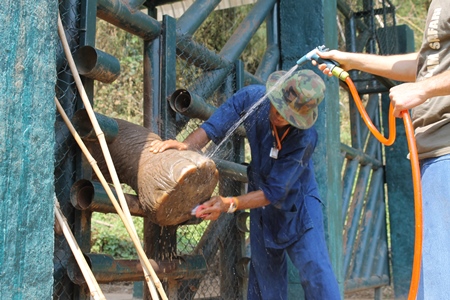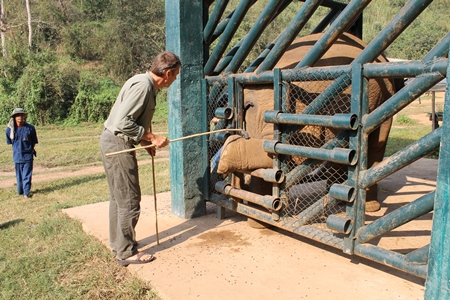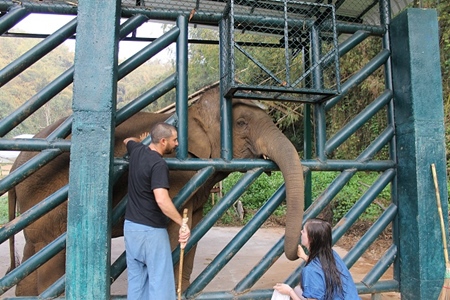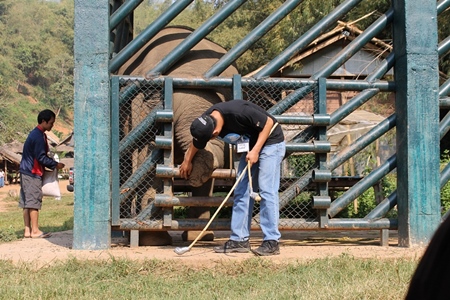Target training has become an increasingly popular and more widely utilized training method in Thailand in recent years. This technique has long been used in the international zoo community to provide safe and effective veterinary care of animals in a protected contact regime. The results have been extremely positive and successful.
Close contact with the elephants between mahouts – elephant handlers – and veterinarians has frequently been stressful for all parties and has occasionally been dangerous for the humans involved. Target training, which relies on positive reinforcement for the elephants for repeated actions, has been found to greatly reduce these elements of stress, tension, and danger.

When trainers and vets come to understand the value and benefits of using these positive reinforcement techniques, routine yet critical elephant care such as foot care, trunk washes, and basic medical treatment become a much more routine, common, and programmatic action in which all parties know what to expect and are thus more prepared and accustomed to. When a series of actions becomes ritualized, and rewards are provided for good behavior, the procedures lose their fearful aspect and actually become fun and joyful encounters.

While working as a veterinary volunteer at Golden Triangle Asian Elephant Foundation Dr Gerardo demonstrated these techniques to them for the first time in order to help with the footcare of one of their elephants, they were so impressed they built a facility based on his designs and adopted these methods themselves.
In light of their successes, Anantara began sharing these methods with other camps in northern Thailand, and as elephant centers across the region became interested in this program, training workshops have been organized and sponsored by Anantara.

The aims of GTAEF and Anantara are to set up a safe haven for rescued, abused, or otherwise incapacitated elephants and to provide secure employment for lifelong mahouts which allow them to continue working with their special charges. The Foundation has long realized and promoted the importance of taking care of Thailand’s elephants, giving them a safe, secure, home and a superior quality of life in captivity.

There have been important changes and major improvements at Anantara after practicing targeting training for several years. The first and probably greatest change has actually been that of modifying the mahouts’ long held behaviors and beliefs about the need to be aggressive in their training of elephants.
These methods of intimidating and controlling elephants through fear has been passed on for generations, and despite many injuries and deaths over the years – many of which are likely attributable to these violent methods – the trainers never modified their approach. Fortunately, this has changed now that the handlers can see the success of using positive reinforcement based on the outcomes of using behavior modification.
Nowadays, the elephants are doing what they’ve never done before: cooperating with the trainers and vets, and even voluntarily positioning themselves to enable the necessary care and treatments to be performed. It is safe to say that both the mahouts and the elephants are now enjoying their routines based on positive reinforcement, protected contact, and occupational therapy.
The GTAEF, through its strong belief in its mission and its proven success has ignited the power of cooperative networking among like-minded, forward-thinking elephant camps and centers throughout Southeast Asia. The Target Training Workshop 2013 is just such an example of networking among professionals with the goal of taking better care of elephants.
The trainer for the workshop is Dr. Gerardo Martinez, a world renowned expert in animal training, and Chief of Animal Behavioral Management Department and Supervisor of African and Asian Elephants since 2000.
The objectives of the workshop are to spread the word about using positive reinforcement for training among Southeast Asia’s elephant community; to begin the widespread use of target training for elephant care, especially foot care and trunk washing; and to increase global awareness of elephant welfare in general.




